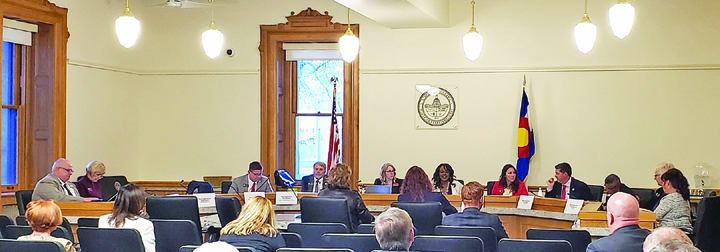As Licensing Disappears For Property Managers, HOA Issues Rise To The Fore
by Ruthy Wexler
Everyone thought HB 1212 would pass.
What House Bill 19-1212 did was reinstate the licensing program for Community Association Managers (CAMs), which was set to expire July 1, 2019. The bill extended CAM licensing for just one year, during which time stakeholders were charged with exploring the issue.

As legislators put HB 1212 together, the usual suspects tried to shape it. Homeowner advocate Stan Hrincevich, pleaded for the inclusion of additional homeowner protections; e.g., ensuring managers document and disclose fees; while the Colorado Legislative Action Committee — legal arm of CAI (Community Association Institute), an international lobby representing management companies, property managers, HOA attorneys and other benefiting vendors — fought to keep such regulatory measures out.
The bill’s sponsors — Representatives Monica Duran and Brianna Titone, Senators Nancy Todd and Rhonda Fields — ended up incorporating most of CAI’s requests, but none from Hrincevich, who voiced disappointment but also relief that “CAM licensing would be kept alive.” The bill passed the Assembly and Senate.
Then on May 31, Governor Jared Polis vetoed HB 1212. Ever since, the Colorado HOA world has been trying to understand what lies ahead.
What’s The Big Deal?
In his two-page veto letter, Polis expressed concerns over “occupational licensing” — the subject of three of the five bills he’d vetoed (out of 460 passed). Such licensing, he said, might “… prevent minorities and the economically disadvantaged from … access[ing] occupations.”
Polis’s concerns, many feel, had little to do with CAM licensing, an issue one homeowner described as the “tip of an iceberg with huge dangerous issues below everyone is afraid to fight.”
“Here’s the essence,” says Hrincevich. “The HOA Property Manager Licensing law was the only path homeowners had to address wrongdoing on the part of a manager.”
Colorado homeowners had no recourse at all — short of going to court, which was too costly and intimidating to be a real option — until 2015, when Colorado passed a law that regulated HOA property managers. Individuals had to pass background checks, get certified, pay a fee and pass an exam, in order to earn a CAM license.
At that point, if a homeowner believed their property manager was behaving illegally, they could file a complaint, citing their CAM’s license number, with the Real Estate Division inside DORA, which had awarded that CAM license — and could take it away.
The process was slow, the results not always to the homeowner’s liking, but, says homeowner and retired financial analyst Barb DeHart, “It allowed homeowners not to feel entirely helpless.”
All Counties Heard From
Post Polis’s veto, reactions varied widely. Legislators, believing they’d done what was necessary to pass the bill, felt betrayed. “I was completely shocked,” said Duran. “Greatly disappointed. The work we’d done to protect homeowners … has been undone.”
HOA homeowners who had been following this issue felt betrayed also, and afraid. “It’s bad enough with [CAM] licensing,” wrote P., a Denver homeowner fearing reprisal from her property manager. “What will [name of manager] do with no oversight at all??”
“As of July 1,” said HOA activist Andrea Antico. “management companies … can do anything they want.”
Realtors were appalled. Live Urban Real Estate listed possible “outcomes of this loss of consumer protection.” Linda Chapman, realtor for over 35 years, called the veto “unconscionable.” She explained, “Management companies and property managers handle millions and millions of dollars of other people’s money. All other industries performing fiduciary duties are required to be licensed and regulated. Except CAMs.”
HOA attorneys appeared lighthearted. “Community association manager licensing is no more!” wrote Elina Gilbert of Altitude Law, in a blog titled, Why Oh Why Did Manager Licensing Die? One HOA attorney described colleagues as “… happily anticipating lots of business …”
One community manager, Sue McClure, said the veto felt like a “slap in the face to those of us that have made the effort to … be professional,” while another, Joe Felice, said he agreed with the Governor. “I don’t believe licensing helped homeowners or associations in any substantive way. … “
Property manager Alec Hrynevich, of Accord Management, said, “I’m not opposed to licensing. But it doesn’t do in this case what it’s supposed to do.”
More than a few managers and homeowners agreed that abuses within HOAs would not necessarily have been prevented if CAM licensing was in effect.
Change The Conversation
The HOA Office releases a report each year that summarizes the complaints they’ve received from homeowners. In 2018, high on the list was management companies and property managers not following their HOA’s governing documents; close behind were poor manager communication, selective enforcement of covenants and failure to produce records, required under Colorado HOA law.

Accompanying Polis’s veto was an Executive Order, number D 2019 006, directing DORA to “lead a … comprehensive review of CAMs and HOAs.” Many homeowners felt excited at the prospect of an open conversation about HOAs.
Since Polis took office, he’s made it clear how hard he will push for issues he is passionate about, like education and health care. He has not made it clear if HOA reform is one of those issues, although Hrincevich noted, “Leaving out further consumer protections [in HB 1212] is what Polis seemed mostly to object to.”
What CAI appears to mostly object to is regulation within HOAs. A map on their website resembles a campaign war room, blue outlining the few states with CAM licensing; click on each state and see what stage the legal battle around that issue has reached. “Stay up to date on CAM licensing and its impact on associations,” encourages CAI Senior Vice President Dawn Bauman.
“With the veto of HB 19-1212,” states Polis in his Executive Order, “the State has an opportunity to change the conversation about … CAMs and HOAs.” As per that order, stakeholder meetings will be held on August 14 and 29, September 12 and October 8 at the DORA offices. Registration is open.
